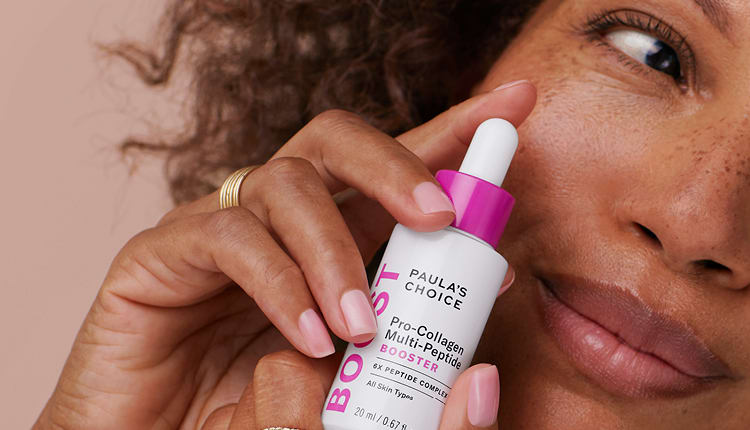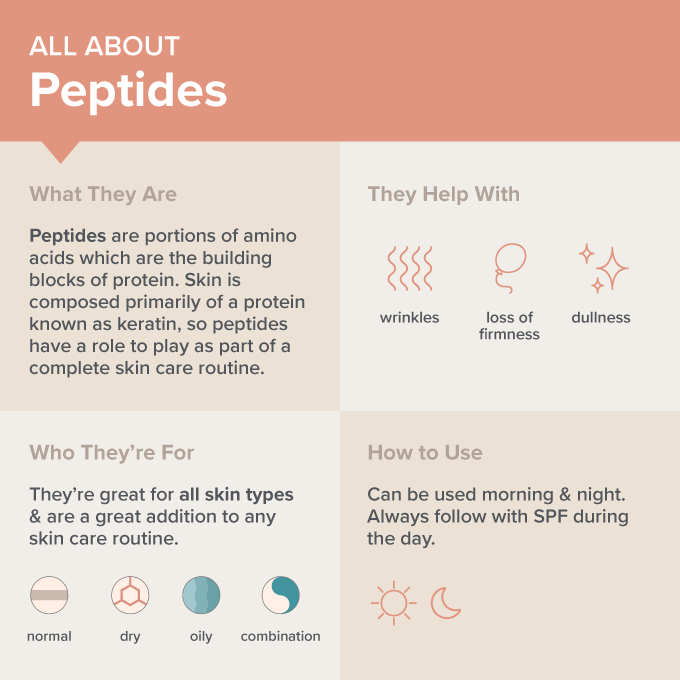Polypeptides are small chains of amino acids. They play a key role in skin health and beauty.
In recent years, polypeptides have gained attention in the skincare world. Many people wonder about their benefits and how they work. These powerful ingredients help support skin structure and promote a youthful appearance. Polypeptides can boost collagen production, improve hydration, and even reduce the appearance of fine lines.
Their ability to signal skin cells to repair and regenerate makes them a popular choice in various products. Understanding what polypeptides are and how they benefit your skin can help you make informed choices for your skincare routine. Let’s explore the world of polypeptides and discover their importance in achieving healthy, glowing skin.
The Science Of Skin Aging
Skin aging is a natural process. It affects everyone over time. Understanding this process helps us care for our skin better.
As we age, our skin changes. It becomes thinner and less elastic. This can lead to wrinkles and fine lines. Many factors contribute to these changes.
Factors Contributing To Wrinkles
Wrinkles appear for many reasons. Sun exposure is a major factor. UV rays damage the skin’s structure.
Smoking also harms the skin. It reduces blood flow and nutrients. This speeds up the aging process.
Stress can play a role too. It affects our skin’s health. Poor diet and lack of sleep can worsen the situation.
Role Of Collagen And Elastin
Collagen and elastin are key proteins in our skin. They provide structure and support. Collagen keeps skin firm, while elastin allows it to stretch.
As we age, collagen and elastin production decreases. This leads to sagging skin and wrinkles. Maintaining healthy levels is essential for youthful skin.
Skincare products with polypeptides can help. They boost collagen and elastin production. This support helps combat signs of aging.
Introduction To Polypeptides
Polypeptides are important in skincare. They help keep skin healthy and youthful. These compounds are made of amino acids. Amino acids are the building blocks of proteins. When you apply polypeptides, they can boost skin’s appearance. They work to improve texture and elasticity.
Many skincare products now include polypeptides. They are popular for their benefits. Understanding polypeptides can help you choose the right products.
Polypeptides Vs. Proteins
Polypeptides and proteins are similar but different. Both consist of amino acids. Polypeptides are shorter chains. Proteins are longer and more complex. Polypeptides can act as signals in the skin. They can help repair and renew skin cells.
Proteins provide structure and strength. They keep skin firm and resilient. While both are essential, polypeptides focus on communication and repair. They play a key role in skincare formulations.
Natural Occurrence In The Body
Polypeptides occur naturally in our bodies. They are found in muscles, skin, and organs. The body produces them during protein breakdown. They aid in various functions, including healing.
As we age, natural polypeptide levels drop. This can lead to wrinkles and sagging skin. Using skincare with polypeptides can help replace what is lost. They support skin’s natural processes.
Polypeptides In Skincare
Polypeptides are short chains of amino acids. They play an important role in skincare. These compounds help to support skin health. Many skincare products now include polypeptides for their benefits.
Benefits For Skin Health
Polypeptides offer several benefits for the skin:
- Hydration: They help retain moisture.
- Elasticity: Polypeptides improve skin firmness.
- Collagen Production: They boost collagen levels.
- Repair: They aid in skin healing.
- Anti-Aging: They reduce fine lines and wrinkles.
Using polypeptides in your skincare routine can enhance skin texture. They make skin look youthful and vibrant. Many users report smoother and softer skin after regular use.
Common Types In Skincare Products
Different types of polypeptides are found in skincare:
| Polypeptide Type | Benefits |
|---|---|
| Palmitoyl Pentapeptide-4 | Stimulates collagen production |
| Acetyl Hexapeptide-8 | Reduces appearance of wrinkles |
| Oligopeptide-1 | Promotes skin healing |
| Tripeptide-1 | Improves skin elasticity |
Check product labels for these polypeptides. They can enhance your skincare routine. Finding the right product can make a big difference.
Mechanism Of Action
Polypeptides play a key role in skincare. They work at a cellular level to improve skin health. Understanding how they act helps us appreciate their benefits.
Stimulating Collagen Production
Collagen is essential for skin elasticity and firmness. Polypeptides signal skin cells to produce more collagen. This process helps reduce fine lines and wrinkles. As collagen increases, skin appears plumper and smoother.
Older skin often lacks collagen. Polypeptides can help replenish this vital protein. They encourage skin to regain its youthful look. Regular use of polypeptide products supports this collagen boost.
Enhancing Skin Repair And Renewal
Polypeptides aid in skin repair. They promote cell regeneration and healing. This action helps the skin recover from damage faster.
Injuries or environmental stress can harm the skin. Polypeptides help to restore its natural barrier. With stronger skin, moisture is locked in, keeping it hydrated.
Using polypeptides in skincare products improves overall skin health. They provide nourishment that the skin needs to thrive. A consistent routine can lead to noticeable improvements.
Choosing The Right Polypeptide Products
Finding the best polypeptide products can be tricky. Many options exist. Understanding how to choose wisely helps you get the most benefits. Look for effective ingredients and the right formulas for your skin type.
Reading Labels For Polypeptide Content
Labels can tell you a lot about a product. Here’s what to look for:
- Ingredient List: Check for polypeptides listed near the top.
- Types of Polypeptides: Look for specific types like Palmitoyl Pentapeptide or Acetyl Hexapeptide.
- Concentration: Higher concentrations often mean better results.
Some brands highlight polypeptide content clearly. Others may not. Read carefully to ensure you are buying a product that works.
Different Formulations And Concentrations
Polypeptides come in various forms. Each form can affect how well it works on your skin. Here are common types:
| Formulation Type | Description |
|---|---|
| Serums | Lightweight and fast-absorbing. High concentration of polypeptides. |
| Moisturizers | Hydrating with added benefits. Usually lower concentration. |
| Masks | Intensive treatment. Often high concentration for short use. |
Choosing the right formulation is key. Think about your skin needs. Moisturizers are great for hydration. Serums can target specific issues.
Check the concentration of polypeptides in each product. Higher concentrations may offer better results. Start with a product that fits your skin type.

Credit: www.paulaschoice-eu.com
Incorporating Polypeptides Into Your Routine
Polypeptides are essential for healthy skin. They help to build proteins like collagen and elastin. These proteins keep skin firm and youthful. Adding polypeptides to your skincare routine can improve skin texture and hydration. Here are some ways to incorporate them effectively.
Best Practices For Application
Using polypeptides correctly enhances their benefits. Here are some best practices:
- Cleanse first: Always start with a clean face. Use a gentle cleanser to remove dirt.
- Use on damp skin: Apply polypeptide products on slightly damp skin. This helps with absorption.
- Follow the instructions: Use as directed on the product label. Each product may have different guidelines.
- Massage gently: Use your fingertips to massage the product in. This boosts blood flow and improves absorption.
- Be consistent: Use products daily for best results. Consistency is key in skincare.
Layering With Other Skincare Ingredients
Polypeptides can work well with other ingredients. Layering them properly can enhance their effects. Here are some guidelines:
| Ingredient | Benefits | Layering Tips |
|---|---|---|
| Hyaluronic Acid | Boosts hydration and plumps skin. | Apply before polypeptides for added moisture. |
| Vitamin C | Brightens skin and evens tone. | Apply Vitamin C first, then follow with polypeptides. |
| Retinol | Improves skin texture and reduces wrinkles. | Use retinol at night, then polypeptides afterward. |
| Sunscreen | Protects skin from UV damage. | Always apply sunscreen last in the morning routine. |
Choose products that work well together. This can help maximize the benefits for your skin.
Clinical Evidence And Studies
Polypeptides have gained attention in skincare science. Many studies explore their effects on skin health. Researchers focus on how they help with aging and hydration. Understanding these results can guide skincare choices.
Research On Polypeptide Efficacy
Several studies show that polypeptides improve skin texture. They boost collagen production, which is vital for skin elasticity. One study found that using polypeptides can reduce wrinkles. Participants noted smoother skin after consistent use.
Another research highlighted the hydration benefits of polypeptides. They help retain moisture, making skin appear plumper. This effect can last for hours after application. Scientists believe this happens because polypeptides attract water to the skin.
Testimonials And User Experiences
User experiences support the clinical findings. Many people report visible improvements. Users claim their skin feels firmer and looks more radiant. They enjoy the smoother texture after using polypeptide products.
Some users share before-and-after photos. These images show noticeable changes in skin appearance. Positive feedback encourages others to try polypeptide-infused skincare. Overall, real-life experiences echo the benefits seen in studies.
Safety And Considerations
Polypeptides are popular in skincare. They help with skin health. But safety is important. Understanding potential side effects and precautions is key.
Potential Side Effects
Most people tolerate polypeptides well. Some may experience redness or irritation. Allergic reactions are rare but possible. Always check for skin sensitivity before use.
If you notice discomfort, stop using the product. Consult a dermatologist for advice. Patch testing is a smart way to avoid issues.
Precautions For Sensitive Skin
Sensitive skin needs extra care. Choose products with gentle formulas. Look for polypeptides without added fragrances or harsh chemicals.
Start with a small amount. Monitor your skin’s response. Gradually increase use if no irritation occurs.
Avoid combining polypeptides with strong active ingredients. This can lead to irritation. Always prioritize your skin’s health and comfort.
Future Of Polypeptides In Dermatology
The future of polypeptides in dermatology is bright. These tiny chains of amino acids hold promise for better skin health. They have unique properties that can help in various treatments. As research continues, new applications will emerge. This could change how we approach skincare.
Polypeptides can improve skin elasticity, hydration, and repair. They may also reduce signs of aging. Dermatologists are excited about their potential. Innovative uses are being explored every day.
Innovative Uses And Treatments
Polypeptides are finding their way into many skincare products. They are used in serums, creams, and masks. These ingredients can boost collagen production. This leads to firmer and smoother skin.
Some treatments focus on wound healing. Polypeptides can speed up the recovery process. They help skin regenerate faster. This is crucial for patients after surgery or injury.
Moreover, polypeptides are being tested in anti-aging treatments. They may help reduce fine lines and wrinkles. This can give skin a youthful appearance. Ongoing studies are revealing their effectiveness.
Ongoing Research And Developments
Research on polypeptides is ongoing. Scientists are exploring new types and combinations. This could lead to stronger formulations for skincare.
Studies are looking at how polypeptides interact with skin cells. Understanding this will improve product effectiveness. New delivery methods are also being tested. These methods will help polypeptides penetrate deeper into the skin.
As more findings emerge, expect to see new products. The knowledge gained will shape future skincare. The dermatology field is excited about these developments. Polypeptides may soon become a standard in skincare routines.

Credit: colibriskincare.eu

Credit: www.paulaschoice.com
Frequently Asked Questions
What Are Polypeptides In Skincare?
Polypeptides are chains of amino acids that play a crucial role in skincare. They help to stimulate collagen production, improving skin elasticity and firmness. By enhancing the skin’s barrier function, polypeptides can also reduce the appearance of fine lines and wrinkles, making them a popular ingredient in anti-aging products.
How Do Polypeptides Benefit The Skin?
Polypeptides provide multiple benefits, including hydration and skin repair. They help in boosting collagen and elastin levels, which can lead to a more youthful appearance. Additionally, they can soothe inflammation and enhance skin texture, making them ideal for various skincare concerns.
Are Polypeptides Safe For All Skin Types?
Yes, polypeptides are generally safe for all skin types. They are well-tolerated and suitable for sensitive skin as well. However, it’s always a good idea to perform a patch test before introducing new products to your routine, especially if you have specific sensitivities.
Can Polypeptides Replace Retinol In Skincare?
While polypeptides and retinol serve different purposes, they can complement each other. Polypeptides primarily focus on hydration and skin barrier repair, while retinol promotes cell turnover. Using both can enhance overall skin health and address various signs of aging effectively.
Conclusion
Polypeptides play an important role in skincare. They help improve skin texture and boost hydration. Many products use them for their anti-aging benefits. Understanding how polypeptides work can guide better skincare choices. Choose products with these ingredients for healthier skin.
Watch for results like improved firmness and smoothness. Remember, consistency is key in any skincare routine. With time, polypeptides can support your skin’s natural beauty. Explore options that suit your skin type and needs. Your journey to better skin can start with polypeptides.







